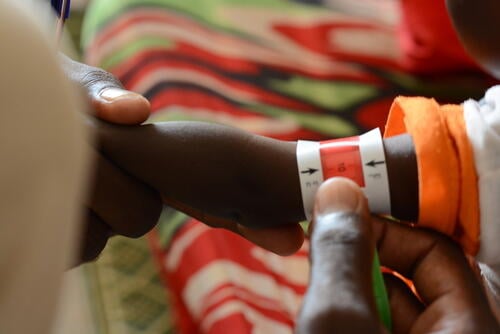- Zamzam camp, a site for internally displaced people in North Darfur state, is under a blockade, with no essential supplies or food reaching its over 300,000 residents.
- A screening conducted this month indicates alarming levels of malnutrition in children, while the unavailability of supplies has meant MSF reduces our activities.
- All options must be considered to quickly deliver food and supplies to the camp.
Paris - The results of a nutrition screening carried out by the Sudanese health authorities and Médecins Sans Frontières earlier this month in Zamzam camp, North Darfur state, Sudan, indicate that malnutrition is only getting worse. Without supplies, we have been forced to reduce our services. The United Nations and all international stakeholders involved in negotiating broader humanitarian access must consider every option to quickly deliver food and essential supplies to the area, including by airdrops.
“Not only do the results confirm the disaster that we and other stakeholders have been observing and alerting on for months, they also indicate that every day things are getting worse and we’re running out of time,” says Michel Olivier Lacharité, head of emergency operations for MSF. “We are talking about thousands of children who will die over the next few weeks without access to adequate treatment and urgent solutions to allow humanitarian aid and essential goods to reach Zamzam.”
Despite hopeful announcements following peace talks in Geneva in mid-August, no significant amount of humanitarian aid has reached people in Zamzam camp nor in nearby El-Fasher since 1 August, when the Integrated Food Security Phase Classification Famine Review Committee concluded that famine conditions were prevalent in the area.
Most supply roads are controlled by the Rapid Support Forces (RSF) who have made it all but impossible to bring therapeutic food, medicines, and essential supplies into the camp since the intensification of fighting around El Fasher in May.
We are talking about thousands of children who will die over the next few weeks without access to adequate treatment and urgent solutions.Michel Olivier Lacharité, head of emergency operations
There is no more time to waste to avoid thousands of preventable deaths. Among the more than 29,000 children under five years old screened last week during a vaccination campaign in Zamzam camp, 10 per cent suffer from severe acute malnutrition, a life-threatening condition, while 34 per cent suffer from global acute malnutrition, which will evolve into severe acute malnutrition if not treated effectively and timely.
“The malnutrition rates found during the screening are massive and likely some of the worst in the world currently,” says Claudine Mayer, MSF medical referent. “It’s even more terrifying as we know from experience the results are often underestimated in the area when we use only the mid-upper arm circumference criteria, like we did here, instead of combining it with measuring [children’s] weight and height.”
A mass screening we carried out in March 2024 revealed an 8 per cent severe acute malnutrition rate and a 29 per cent global acute malnutrition rate, which was already double the alert threshold of the World Health Organization, 15 per cent.
The only food available is from pre-existing stocks, which is not sufficient for the people living in the area. Additionally, food prices are at least three times higher in El Fasher compared to the rest of Darfur region. Fuel prices are soaring as well, making it difficult to pump water and run clinics that rely on generators for electricity. Our staff on site report that many people only expect to eat one meal a day.
“In such a dire situation, we should be scaling up our response,” says Mayer. “Instead, running critically low on supplies, we are reaching a breaking point and were recently forced to reduce our activity to focus solely on children in the most severe condition.”
In such a dire situation, we should be scaling up our response.Claudine Mayer, MSF medical referent
“This means we had to suspend treatment for the less severe forms of malnutrition, who represented an active cohort of 2,700 children, and to put an end to consultations provided to adults and children over five years old, who amount to thousands of consultations every month,” she says.
Zamzam camp is estimated to host between 300,000 and 500,000 people, many of whom have been displaced many times over. They arrived in Zamzam camp fleeing the war that has been tearing up Sudan since last year.
“Due to these unconscionable blockages on supplies, we feel like we are leaving behind an increasing number of patients who already had very few options for getting lifesaving medical care,” says Lacharité. “If the roads are not an option for getting massive quantities of urgent supplies into the camp, the United Nations should look at every available option. Delaying these supplies means causing more deaths – possibly thousands of them.”



